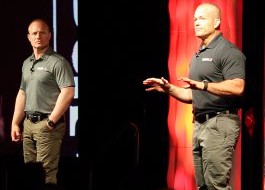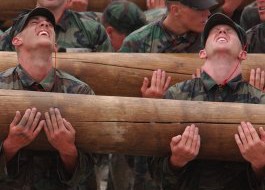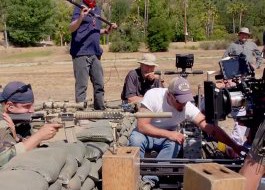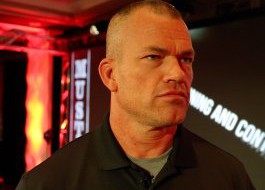 Leif Babin and Jocko Willink.Joe Avella/Business Insider
Leif Babin and Jocko Willink.Joe Avella/Business Insider
It was former US Navy SEALs Jocko Willink and Leif Babin, and they had just finished the outdoors workout I was about to start. I later learned they had gotten up at 3:15 a.m. — about the time I woke up in Brooklyn to show up on time — and started exercising a half hour later.
I was there to attend day one of Echelon Front's Muster conference, a chance to immerse myself in the minds of some SEALs for 12 hours. After that and the next day's Brazilian jiujitsu introduction in Queens, I was left with a toolkit of career and fitness insights that overcame the potential pitfalls of the "civilian pretends to be in military for a day" cliché.
I had interviewed Willink and Babin a few times since 2015, but this was a chance for me to play on their field for the first time, and that meant trying one of their favorite habits: waking up before dawn to work out.
Of the 436 people in attendance, there were about 300 who showed up for the workout that cold morning. Plenty of them were brimming with excitement at the prospect of "getting after it," as Willink and Babin like to say.

Willink and Babin waived the $2,295-to-$2,895 fee for me and Business Insider video producer Joe Avella.
Muster lasted two days and attracted 436 people from 46 states and 12 foreign countries. Avella and I were there to attend the first day, May 4, in full, as well as the bonus jiujitsu lesson that concluded day two.
We jogged a few blocks to Bryant Park. I have a half marathon coming up, and the light jog got me wondering whether this was going to be an easy workout catered to a bunch of the middle-aged attendees. I was getting ahead of myself, as I'd soon discover.

Willink, Babin, their Task Unit Bruiser buddy Jeremiah "JP" Dinnell — who joined Echelon Front last fall — and a friend of Babin's, CrossFit coach Bryan Kapustinski, gathered everyone in the park. It was about 4:50 a.m., and the streets were mostly empty.

There was a gauntlet of six exercises: flutter kicks, push-ups, squats, jumping jacks, sit-ups, and burpees. We performed each nonstop for two minutes, with a sprint (or as close as I could get to one) in between.

If you're wondering what a burpee is, you can check out this explainer.
They surprised us with a round two, and my lack of sleep combined with dehydration got me feeling a bit nauseous. I did the push-ups from my knees and crunches for the situps.

We wrapped up the workout with a group session of 48 burpees.

The 48 burpees were done in honor of the SEAL Charles "Chuck Heavy" Keating IV, who was killed in action in Iraq last year — he carried a hefty Mark 48 machine gun.
My burpees came out more like a painful and ugly step-by-step yoga routine, but I saw the SEALs also had less-than-perfect form, so I got through them.
On the walk back, the sun was coming up, and adrenaline kept my exhaustion at bay. To Willink and Babin's credit, it did feel good to get in a workout while the rest of the city slept.

As Willink later told me: "Why do you want to get a good workout early in the morning? Well, because it sends more oxygen to your brain, it releases endorphins, it puts you in a state of mind where you can crush things, which is where you want to be."
He said you also realize how rewarding it is to have the entirety of the morning to get things done, and the act of getting up early requires initiative that "is the root of the discipline that you need as a leader."
After a shower at a local gym, I returned to the hotel at about 7:45 a.m. to sign in.

The guys had a merch table set up, where you could buy some Echelon Front gear, their bestseller "Extreme Ownership," and Jocko's new children's book, "Way of the Warrior Kid."
And the tear-proof, waterproof swag bags they gave us were pretty cool. Over the course of the day I got through two Kill Cliff energy drinks and Honey Stinger energy bar, and made use of Jocko's brand of white tea and "Alpha Brain" nootropics the next day. I also got a sweet Muster water bottle and a "Get After It" gym towel to wipe up all the sweat, blood, and tears that may ensue in a SEAL workout.
The seminars took place in one of the hotel's ballrooms, and the setup was impressive.

Most of those in attendance were men I estimated to be over the age of 30, and a few told me they were there because they learned about Echelon Front from Willink's appearances on Tim Ferriss' and Joe Rogan's podcasts.
I chatted with an NYPD captain who came to the event because he wanted to bring lessons back to his precinct.
A video introduction similar to a trailer to an action film kicked things off, and Babin and Willink took the stage like rock stars. There would be plenty of heavy guitar riffs throughout the day.

You can watch the intro video here »
Willink and Babin started by sharing a bit about their background.

Willink led SEAL Team 3's Task Unit Bruiser, the most decorated special operations unit of the Iraq War, and he created a culture of discipline and responsibility he dubbed "extreme ownership." Babin was the commander of one of Bruiser's two platoons. After their military service, the two of them created Echelon Front in 2010 as a way to pass on the leadership and management lessons they developed in the SEALs to a business audience.
Their 2015 book, "Extreme Ownership," became a New York Times best-seller, and Willink started a podcast that's usually among the 100 most downloaded on iTunes. They launched their first "Muster" event in San Diego last October, and it proved so successful they decided to take it on the road.
Babin said that contrary to popular belief, BUD/S training for the SEALs is just a screening process, and the training doesn't begin until you're placed into your unit. Willink explained how as a young SEAL he felt indestructible, but then things changed when the insurgency gained momentum in Iraq and he knew the situation was much more challenging than the US predicted.
The highlight of Willink and Babin's military career came during the 2006 Battle of Ramadi, in which their SEAL task unit worked with the Army, the Marines, and the Iraqi Security Forces in an attempt to win the city from Al Qaeda, a task that once seemed nearly impossible.

The 2006 Battle of Ramadi from April through November, and Task Unit Bruiser was there from April 3 to October 21.
Willink said while many civilians mistakenly see SEALs as "Terminator" robots, they're human beings with big egos that need to be carefully managed.

The fundamentals for leading a bunch of SEALs, he said, are no different from those managing a group of employees in an office.
This experience led Willink to develop the philosophy of extreme ownership and the "four laws of combat."

Boiled down:
• A team's leadership is more important than the sum of its members' talents and skills.
• Great leaders must take full responsibility for everything under their watch.
• The team's goals must always take precedent over egos.
• The best leaders communicate simply to their subordinates and ensure they understand the mission.
• These leaders must build trust with their subordinates and give them the freedom to make quick decisions without guidance.
The guys gave a simple hypothetical scenario to show these principles in action.

Willink sets a mission for Babin and his men to secure a building and move to its roof to provide cover for another team. Babin's team gets to the roof only to see there are no protective walls, making them easy targets.
If Willink led his team poorly, Babin would order his men to get on their bellies and would then radio Willink to see what they should do next. If Willink led his team well, Babin would immediately move his team off the roof and take them instead to the top floor to secure an adequate position, and then he would notify Willink of the change of plans and why they were made.
After a quick break, Willink and Babin took questions from audience members who were struggling with various issues at work.

The guys played a video for us by Willink's buddy Echo Charles, who is also the producer of "Jocko Podcast."

It was about how Willink developed a habit of initially answering concerns from his subordinates with, "Good." "When things are going bad, there's going to be some good that's going to come from it," Willink says, and he trained his men to focus on that when confronting problems.
You can watch the video here »
Willink and Babin then got into "the dichotomy of leadership," which comprises 12 areas a leader is always carefully balancing. I took notes throughout.

You can learn more about 'the dichotomy of leadership' here »
One of these balancing acts is how to practice extreme ownership while also adhering to the freedom of "decentralized command."

Willink made an interesting point that if there is up to about a 60% chance that a leader's plan will yield the desired result, compared with a 40% chance the subordinate's plan will, the leader should go with the subordinate's plan.
That's not to say, of course, that you should go with a decision that would harm your team. Willink explained that if a subordinate's plan is clearly inferior, it's the leader's job to explain why, rather than make a demand. His point was that a leader must be willing to cede minor things so subordinates can take ownership for their work.
If one of your reports runs into a challenge with the plan you forced on him, Willink said, he will blame you for the trouble and be less prepared to react in a constructive way; if a challenge arises in his own plan, he has to answer to himself.
Willink also added that you don't want to be an "easy button" that doles out quick fixes. When your team members come to you with questions, he said, have them explain to you what they're thinking and make an attempt at an answer before helping them out.
Another concept is that "a leader must lead but also be ready to follow."

Babin was the leader of the platoon that contained famed "American Sniper" Chris Kyle, and he said he remembered one mission in which Kyle insisted that a sniping location he had picked was better than the one Babin chose. Because of the strong relationship he shared with Kyle, he could cede that decision. It turned out Kyle's opinion was the much better one.
I had a chance to ask a question in the second Q&A round.

Several people were asking variations of how to get your team on the same page when only one was following all the principles discussed, but I wanted to see what the guys thought one should do when a team was clicking but there was distrust of the boss' boss, or the head of the entire organization.
Both of them drew from their time in the SEALs to answer.

Babin said it may be possible to bring senior leadership to the "front lines" and show them how your experience isn't gelling with their expectations of you, or their read of the situation — basically, make an attempt to be transparent and helpful if there's an opportunity.
Willink added, however, that sometimes the harsh reality may be that in a large-enough organization — like Socom or the US Navy — you will have no control over what the top leadership can do. He said that during the Iraq War there were plenty of times when there was chaos over the direction of the war or what role the SEALs were playing, but all he could do was act as the buffer between that mess and his own team and ensure that it didn't affect them.
It was then time for lunch, which for me was pot roast, broiled chicken, greens, and then a couple of cookies and iced tea. It felt good to get some food, but the reality of getting up at 3:15 to work out was hitting me hard. I found it difficult to hold a conversation.

I needed a constant source of caffeine to get through the postlunch lull — the entire ballroom seemed to have gotten a bit sleepy.

I was jolted awake when the speakers lit up with machine-gun fire and the television screens projected intense, raw war footage.

Then the man from that footage took the stage with a rush of energy. It was JP, the newest member of Echelon Front and Chris Kyle's counterpart in the platoon Babin didn't lead.
JP's message was that the only reason he was able to survive the extreme conditions of the Battle of Ramadi is that Willink had instilled in the entire unit a "why."
He explained that having candid conversations with your team about what compels them to succeed is necessary for there to be any chance of the team's making it through a difficult situation.
In a "Jocko Podcast" episode I later listened to, Willink said one of the major mistakes of the Iraq War was assuming that once Saddam Hussein was toppled, the majority of Iraqis would share the same vision as the American forces did. But because the Iraqi allies didn't have the same "why," as JP put it, as the American troops they were fighting alongside, many American plans unraveled.
The renewed energy continued with another Echo Charles video, this one starring Babin.

It centered on one of the most popular lines among Echelon Front fans: "It's not what you preach; it's what you tolerate." I saw it as an obvious yet easily ignored reminder that anything I've learned over my career and reminded myself of or told others about is meaningless if I'm not actually acting accordingly.
You can watch the video here »
After a few more lessons, they told a story of the first big push into the city of Ramadi, against an incredibly dangerous Al Qaeda stronghold.

Babin said they had become so focused on the enemy that they were losing sight of intrateam communication and ended up with a friendly .50-caliber machine gun pointed at them for that reason. The lesson was that the worst enemy you'll ever face is yourself, and regardless of what anyone around you is doing, you are always responsible for your own actions.
I had a chance to talk to both Willink and Babin on their own toward the end of the day.

"Anybody who tells you that a two-day conference, you're going to turn into the General Patton of leadership, they're not telling you the truth," Willink said. "But you can learn the fundamentals, you can absolutely understand the fundamentals. And then you can go back into your world, you can continue to try and develop what you learned, and you can absolutely improve your leadership competency and capability."
I asked Babin what I should leave with.

"The biggest takeaway that you can have from this is looking yourself in the mirror and thinking, 'Where can I do better?'" Babin said. "Taking ownership instead of blaming others, finding excuses, or maybe even denying that problems exist ... And a lot of that is about checking your ego."
I did not attend day two of Muster, but I made it to the introduction to Brazilian jiujitsu that evening.

Willink, Babin, and Echo Charles all train in the martial art. About 80 men and women showed up at Renzo Gracie Astoria in Queens, the gym where Babin trains.
JP showed up, too, and he led the warmup exercises.

Willink and Charles have been practicing Brazilian jiujitsu for many years and often discuss it on their podcast, using fighting scenarios to apply military leadership principles to the individual level.

Brazilian jiujitsu is more like a physical chess match than a street fight, and proper technique can triumph over sheer strength.

It's similar to wrestling in that matches take place on the ground, and so I got down on the mats for a couple of basic defensive exercises.
I found the "chess game" aspect of jiujitsu to be really interesting, and I may actually sign up for a class someday.
After talking to Willink and Babin about Brazilian jiujitsu, it made sense to me why they chose to incorporate it into the Muster event — beyond the obvious appeal of having fun.

With jiujitsu, anyone physically capable can become a skilled fighter who can take on any opponent of a similar or lesser level, regardless of their natural body size — as long as they are highly disciplined.
And as one of the key Echelon Front lessons goes, "Discipline = Freedom."




